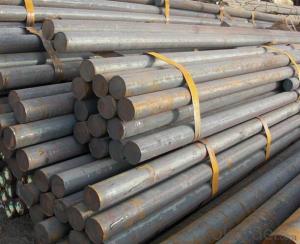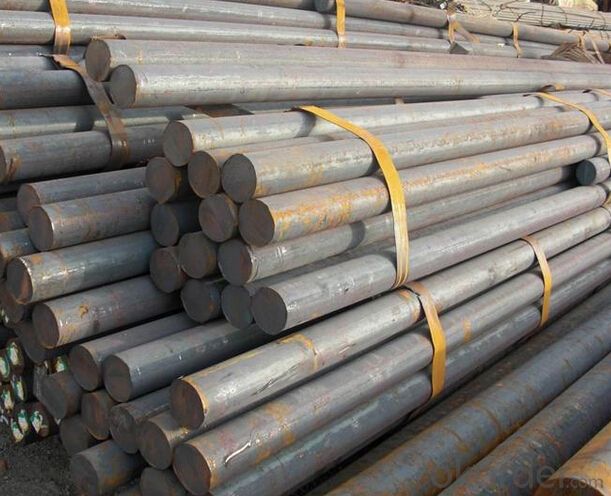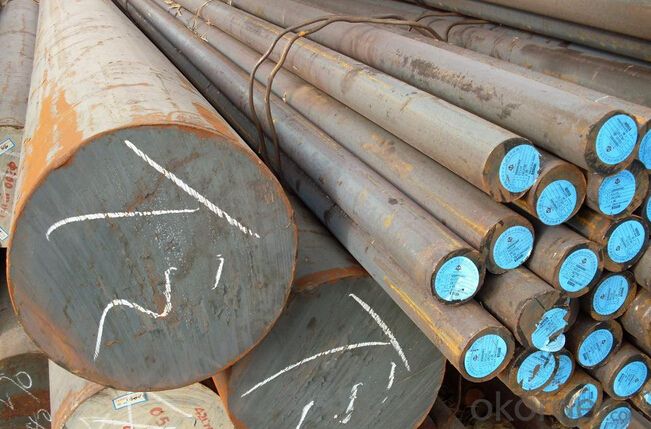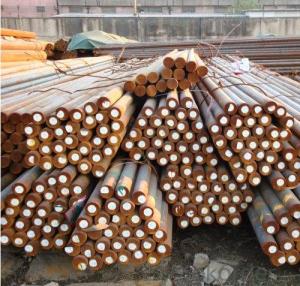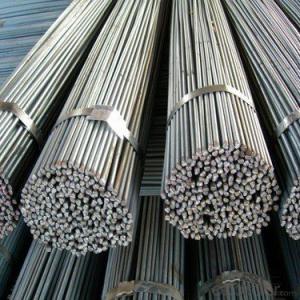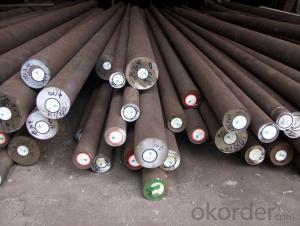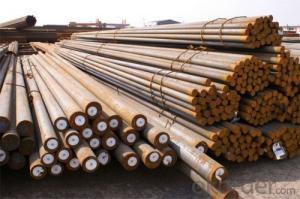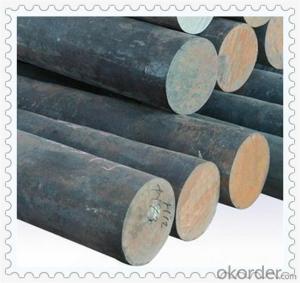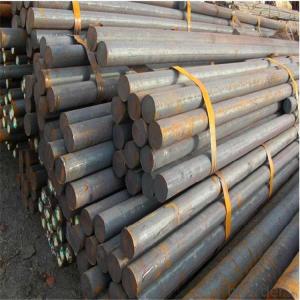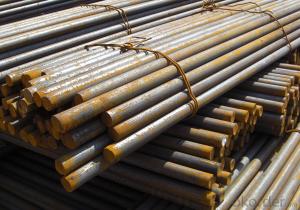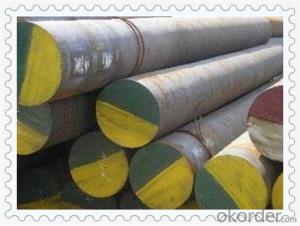Hot Forged Alloy Steel 4140 Round Bars Special Steel
- Loading Port:
- China main port
- Payment Terms:
- TT OR LC
- Min Order Qty:
- 30 m.t.
- Supply Capability:
- 10000 m.t./month
OKorder Service Pledge
OKorder Financial Service
You Might Also Like
Specification
Main Product
Plastic Mould Steel
DIN 1.2311,1.2738,1.2083,1.2316 etc.
AISI P20,P20+Ni,420 etc.
JIS SUS420J2
Hot Work Steel
DIN 1.2344,1.2343,1.2367,1.2365,1.2581,1.2713 etc.
AISI H13,H11,H10,H21, etc.
JIS SKD61,SKD6,SKD5,SKT4 etc.
Cold Work Steel
DIN 1.2739, 1.2601, 1.2080, 1.2436, 1.2631, 1.263, 1.2510, 1.2327 etc.
AISI D2, D5, D3, D6, A8, A2, O1 etc.
JIS SKD10, SKD11, SKD1, SKS3 etc.
High Speed Steel
DIN 1.3343, 1.3243, 1.3247, 1.3355 etc.
AISI M2, M35, M42, T1 etc.
JIS SKH51, SKH35, SKH59, SKH2 etc.
Alloy Structural Steel
DIN 1.7035,1.6511,1.7220,1.7225 etc.
AISI 5140, 4340, 4135, 4140 etc.
JIS SCr440,SNCM439,SCM435,SCM440 etc.
Stainless & Carbon Steel or Others
DIN 1.4125,1.1191 etc
AISI 440C,1045, 1020 etc.
JIS SUS440C,S45C etc
Carbon Steel Round Bar | SS400, S235JR,Q235, ASTM A36, Fe360A, Fe360B,SM400A,080A15, SS41,E235B |
SAE 1020, AISI 1020, ASTM 1020, S20C, 20#, 050A20 | |
SAE 1045, AISI 1045, ASTM 1045, S45C, 45#,EN8, XC45, XC48, 45B, C45, CK45, CM45, 060A47, R683/IC45e | |
Alloy Steel Round Bar | 40Cr, DIN 1.7035, SAE 5140, AISI 5140, ASTM 5140, SCr440, 41Cr4, 530A40, 42Cr4, 40X, R683/VII3 |
SAE4140,42CrMo, 42CrMo4, DIN 1.7225, SCM440,EN19, 42CD4, 708M40, R683/II3 | |
SAE 4340, 40CrNiMoA, EN24, SNCM439, 817M40,40XMA, R683/III4 | |
SAE 8620,,AISI 8620, ASTM 8620, 20CrNiMo,SNCM220, 805M20 | |
SAE52100, AISI52100,ASTM E52100, GCr15, SUJ2, 100C6, 100Cr6, 1.3505, 534A99, IIIX15 |
Product show
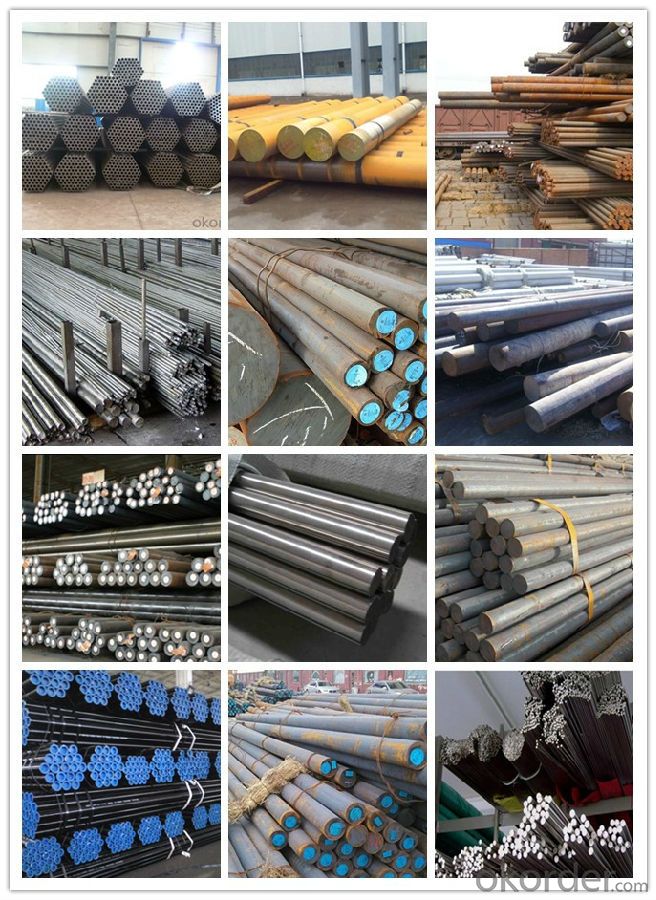
Workshop show
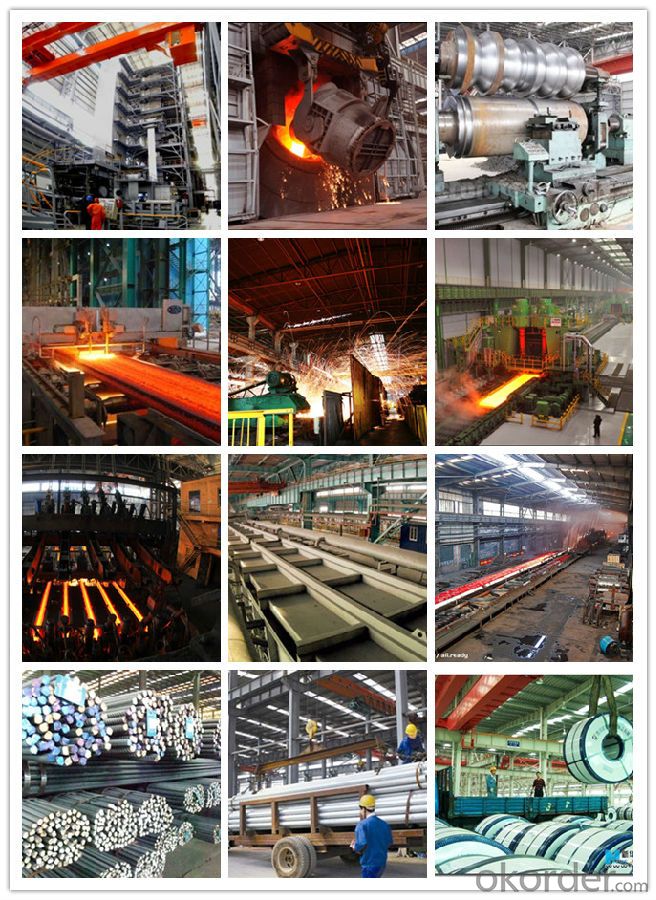
Shipping
1. FedEx/DHL/UPS/TNT for samples, Door-to-Door;
2. By Air or by Sea for batch goods, for FCL; Airport/ Port receiving;
3. Customers specifying freight forwarders or negotiable shipping methods!
Delivery Time: 3-7 days for samples; 5-25 days for batch goods.
Payment Terms
1.Payment: T/T, L/C, Western Union, MoneyGram,PayPal; 30% deposits; 70% balance before delivery.
2.MOQ: 1pcs
3.Warranty : 3 years
4.Package Informations: 1) EXPORT, In 20 feet (GW 25 ton) or 40 feet Container (GW 25 ton)
2)as customer's requirement
Why choose us?
(1) The leading exporter in China special steel industry.
(2) Large stocks for various sizes, fast delivery date.
(3) Good business relationship with China famous factories.
(4) More than 7 years steel exporting experience.
(5) Good after-sales service guarantee.
- Q: How does special steel contribute to improving product safety in high-risk industries?
- Special steel plays a crucial role in improving product safety in high-risk industries due to its unique properties and characteristics. Its exceptional strength, durability, and resistance to corrosion make it highly reliable and less prone to failure under extreme conditions. By using special steel in the manufacturing of critical components and structures, such as in aerospace, automotive, and oil and gas industries, it ensures enhanced safety and prevents potential accidents or catastrophic failures. Additionally, the strict quality control and certifications associated with special steel guarantee that it meets the industry's stringent safety standards, providing peace of mind to both manufacturers and end-users.
- Q: What are the heat treatment processes used for special steel?
- Some of the heat treatment processes used for special steel include annealing, quenching, tempering, and hardening. Annealing involves heating the steel to a specific temperature and slowly cooling it to improve its ductility and reduce internal stress. Quenching is a rapid cooling process that hardens the steel by quickly cooling it from a high temperature, creating a tough and wear-resistant material. Tempering is a process that follows quenching, where the steel is reheated to a lower temperature to reduce brittleness and improve toughness. Hardening involves heating the steel to a high temperature and then rapidly cooling it to increase its hardness and strength. These heat treatment processes are used to enhance the properties and performance of special steel for various applications.
- Q: What is the impact of impurities on the machinability of special steel?
- The impact of impurities on the machinability of special steel can be significant. Impurities in the steel, such as sulfur, phosphorus, and non-metallic inclusions, can adversely affect the performance and machinability of the material. Sulfur is commonly present in steel as an impurity, and it tends to form brittle compounds that can reduce the machinability of the steel. High levels of sulfur can lead to increased tool wear, poor surface finish, and decreased cutting tool life. Therefore, it is essential to control the sulfur content in special steel to ensure good machinability. Phosphorus is another impurity that can have a negative impact on machinability. It tends to form hard and brittle compounds, which can cause tool chipping, breakage, and poor chip control. High levels of phosphorus can also lead to reduced cutting tool life and surface finish. Non-metallic inclusions, such as oxides, sulfides, and silicates, are also significant impurities in steel. These inclusions can act as stress concentrators, leading to increased tool wear and decreased machining quality. Large inclusions can cause tool breakage and interrupt the machining process. Therefore, minimizing the presence of non-metallic inclusions is crucial for improving the machinability of special steel. Overall, impurities in special steel can have a detrimental effect on its machinability. To ensure good machinability, it is important to control and minimize the levels of impurities like sulfur, phosphorus, and non-metallic inclusions. This can be achieved through careful selection of raw materials, refining processes, and quality control measures during the manufacturing of special steel.
- Q: What are the properties of corrosion-resistant alloy steel?
- Corrosion-resistant alloy steel possesses properties such as high resistance to rust, corrosion, and oxidation, making it suitable for applications in environments exposed to moisture, chemicals, or extreme temperatures. It typically contains elements like chromium, nickel, and molybdenum, which enhance its resistance to corrosion. Additionally, this type of steel is known for its durability, strength, and ability to maintain its integrity in challenging conditions.
- Q: How does special steel contribute to the manufacturing of surgical instruments?
- Special steel, also known as stainless steel, plays a crucial role in the manufacturing of surgical instruments. The unique properties of special steel make it an ideal material for producing high-quality surgical instruments that are used in various medical procedures. Firstly, special steel is highly resistant to corrosion and rust. Surgical instruments are constantly exposed to bodily fluids, sterilization processes, and harsh cleaning agents. The corrosion resistance of special steel ensures that these instruments remain durable and can withstand repeated use and cleaning without losing their integrity. Secondly, special steel has excellent strength and hardness properties. Surgical instruments need to be sturdy and able to withstand the forces and pressures exerted during surgeries. The high strength and hardness of special steel ensure that these instruments retain their shape and sharpness even after multiple uses, reducing the risk of breakage or deformation during critical procedures. Moreover, special steel is biocompatible, meaning it does not react with bodily tissues or fluids. This is crucial for surgical instruments that come into direct contact with patients' bodies. The biocompatibility of special steel ensures that there are no adverse reactions or complications when these instruments are used in surgeries, minimizing the risk of infections or other complications. Additionally, special steel can be easily machined and fabricated into intricate shapes and designs. Surgical instruments require precision and accuracy to perform their intended functions effectively. The machinability of special steel allows manufacturers to create complex instruments with fine details and features, ensuring their optimal performance during surgical procedures. Furthermore, special steel can be sterilized efficiently. Sterilization is a critical step in ensuring the safety and effectiveness of surgical instruments. Special steel's ability to withstand high temperatures and various sterilization methods, such as autoclaving or ethylene oxide gas sterilization, makes it an ideal material choice for surgical instruments. In conclusion, special steel contributes significantly to the manufacturing of surgical instruments due to its corrosion resistance, strength, biocompatibility, machinability, and sterilization capabilities. These properties ensure that surgical instruments made from special steel are durable, reliable, safe, and effective in medical procedures, ultimately contributing to the overall success of surgeries and patient outcomes.
- Q: What are the different tooling grades of special steel?
- There are various tooling grades of special steel, each designed to fulfill specific requirements and applications. Some common tooling grades include high-speed steel (HSS), which is known for its excellent heat resistance and durability; carbide steel, which is extremely hard and suitable for cutting tools; and stainless steel, which offers corrosion resistance and is commonly used for precision tools. Other tooling grades may include alloy steel, tool steel, and die steel, among others, each tailored to different tooling needs.
- Q: How does special steel perform in high-speed applications?
- Special steel performs exceptionally well in high-speed applications. Its unique composition and properties, such as high strength, hardness, and toughness, allow it to withstand extreme conditions, including high temperatures, vibrations, and stresses. This ensures reliable performance, minimal wear, and extended service life, making special steel an ideal choice for high-speed applications where precision, durability, and efficiency are critical.
- Q: What are the limitations of special steel?
- Some limitations of special steel include its high cost and limited availability, as well as the difficulty in shaping and processing it. Additionally, special steel may have lower tensile strength compared to other materials and can be prone to corrosion if not properly maintained.
- Q: What is the impact of high temperature on the mechanical properties of special steel?
- High temperature has a significant impact on the mechanical properties of special steel. When exposed to high temperatures, special steel may undergo a phenomenon called thermal softening, where its mechanical strength decreases. This is primarily due to the reduction in the material's yield strength and hardness at elevated temperatures. One of the key effects of high temperature on special steel is the reduction in its ability to resist deformation. At elevated temperatures, the steel becomes more ductile, meaning it is more prone to elongation and plastic deformation. This increase in ductility can result in a decrease in the material's ability to maintain its shape and integrity under load, which can lead to distortion, warping, or even failure of the component. Furthermore, high temperatures can also cause changes in the microstructure of special steel. For instance, prolonged exposure to elevated temperatures can lead to the formation and growth of grain boundaries, which can weaken the material's mechanical properties. Additionally, high temperature can promote the diffusion of impurities or alloying elements within the steel, altering its chemical composition and potentially affecting its mechanical behavior. Another consequence of high temperature on special steel is the reduction in its resistance to corrosion and oxidation. At elevated temperatures, the steel is more susceptible to oxidation, which can result in the formation of scales or even complete material degradation. This can compromise the steel's mechanical properties, such as its strength and toughness. In conclusion, high temperature has a detrimental impact on the mechanical properties of special steel. It reduces the material's strength, increases its ductility, alters its microstructure, and decreases its resistance to corrosion and oxidation. Therefore, it is crucial to consider the effects of high temperature when designing and selecting special steel for applications that involve exposure to elevated temperatures.
- Q: How is corrosion-resistant steel used in marine applications?
- Corrosion-resistant steel is widely used in marine applications due to its ability to withstand the harsh and corrosive environment of seawater. It is used in the construction of various marine structures such as ship hulls, offshore platforms, and underwater pipelines. The steel's unique composition, usually containing elements like chromium, nickel, and molybdenum, forms a protective oxide layer on its surface, preventing corrosion and maintaining its structural integrity over a long period. This helps to improve the durability, longevity, and overall performance of marine equipment and structures, reducing maintenance costs and ensuring safety in maritime operations.
Send your message to us
Hot Forged Alloy Steel 4140 Round Bars Special Steel
- Loading Port:
- China main port
- Payment Terms:
- TT OR LC
- Min Order Qty:
- 30 m.t.
- Supply Capability:
- 10000 m.t./month
OKorder Service Pledge
OKorder Financial Service
Similar products
Hot products
Hot Searches
Related keywords
